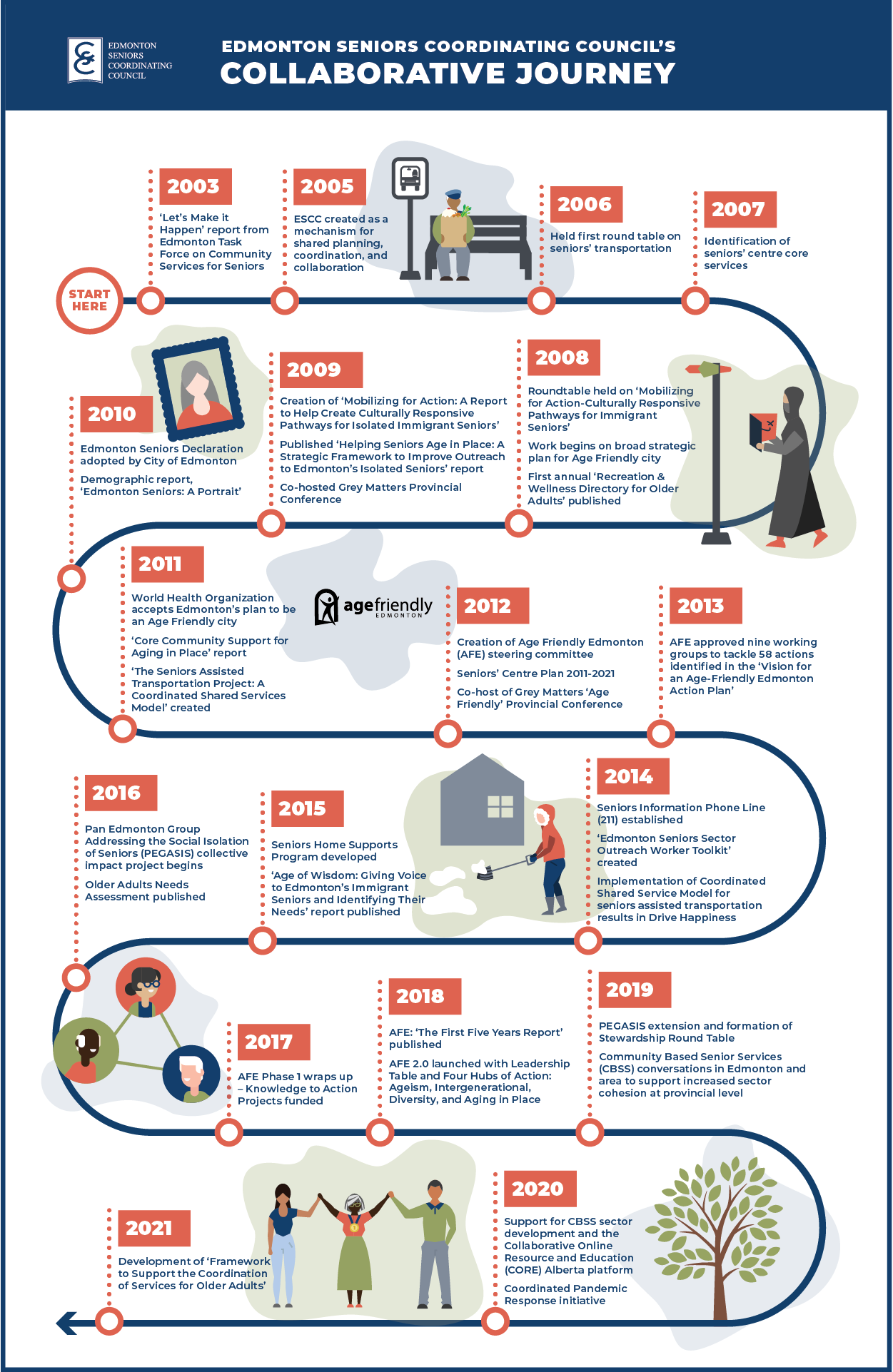Past Work & Projects
Since its inception, ESCC has been at the centre of many discussions and initiatives to build Edmonton’s seniors sector.
In 2005, ESCC was created as a coordinating body tasked with convening key players and facilitating the cohesion required to make progress on issues impacting older Edmontonians. This development came after years of conversations within Edmonton’s seniors serving sector, and a key document known as the 'Let’s Make It Happen' report which identified action areas and factors in healthy aging.
ESCC has a long history of collaboration. Discover some of the milestones from our work below.

ESCC's Work Through the Years
Age Friendly Edmonton is part of the global Age Friendly movement initiative by the World Health Organization. ESCC, with help from member organizations, developed an Age Friendly Edmonton Action Plan. In 2011, the Edmonton Seniors Coordinating Council, working with the City of Edmonton, applied to become part of the global movement. The Age Friendly Edmonton Action Plan was accepted by the WHO and in 2012, an Age Friendly Edmonton Steering Committee was convened to plant the seeds of the movement in Edmonton.
In 2013, nine working groups were created to address 58 actions needed for building an Age Friendly Edmonton. This work was supported by city council and a budget was approved for five years to implement the action plan in partnership with the City of Edmonton.
The Action Plan set various projects into motion and laid the groundwork for many contemporary support services, including Alberta Seniors' Centre Without Walls, Seniors Home Supports Program, and Seniors Information Phone Line (211 Alberta). The collective also accomplished an array of evaluative reports to move the sector forward in the areas of diversity, programming, outreach, isolation and more. A comprehensive review of these measures can be found in the 2018 report, ‘Age Friendly Edmonton: The First Five Years.’
In 2018, Age Friendly Edmonton restructured into four key hubs: Encouraging Intergenerational Connections, Reducing Ageism, Supporting Aging in Place, and Responding to Diversity. Since then, the Hubs have been hard at work on various projects to address issues affecting older Edmontonians.
A podcast, the Shared Mic: Conversations for the Ages, was created by the Intergenerational and Diversity Hubs in 2019, with a focus on bringing together people of all ages and backgrounds for rich conversations. In 2020, the Ageism Hub conducted an anti-ageism campaign, ‘Grow Older With Me’ to get people sharing the positive aspects of aging. The campaign collected dozens of anecdotes from community members throughout the week. The Ageism Hub undertook a collaboration with the Beaumont chapter of Cycling Without Age -- an initiative to get older adults cycling again through the innovative mechanism of ‘trishaws’ (bicycles outfitted with passenger compartments). The effort resulted in GEF Housing facilities adopting trishaws for the enjoyment of residents.
In 2021, the Age Friendly Edmonton Hubs started hosting online community Lunch ‘n’ Learns where community members can get engaged with aging topics.
Related resources:
Learn more: Age Friendly Edmonton
Age Friendly Edmonton: The First Five Years (2018)
Advancing Age Friendly Edmonton: What We Heard (2017)
Transportation is a basic need and a key determinant of health. Without access to reliable transportation, older adults are unable to attend medical appointments, go to the grocery store or bank, or enjoy many mental health benefits that come from getting out in their community. With such a strong need, the Edmonton Seniors Coordinating Council convened a roundtable on the subject in 2006. And it remains a top priority to this day.
There have been many milestones in this work over the years. In 2011, ESCC participated in the Seniors Assisted Transportation Project, which would result in the implementation of a coordinated shared service model for seniors assisted transportation in 2014. This work gave rise to the creation of Drive Happiness, a voluntary door-thru-door transportation provider offering subsidized rides for lower-income older Edmontonians.
ESCC continues to work with policymakers and community-based seniors serving organizations to make assisted transportation a priority.
Related resources:
Provincial Assisted Transportation Advocacy Brochure (2020)
Municipal Assisted Transportation Advocacy Brochure (2020)
Assisted Transportation Volunteer Driver Program Toolkit (2018)
Building a Sustainable Assisted Transportation Service: A Collaborative Approach (2018)
Seniors Assisted Transportation Project: A Coordinated Shared Service Model (2011)
Supporting the needs of a diverse aging population has been a priority for ESCC since its inception. ESCC has completed projects to better understand and support the needs of LGBTQ2S+ people; immigrants, refugees, and newcomers’; and members from Indigenous and other historically marginalized ethnocultural communities.
Some of ESCC’s earliest work in this area includes participating in 2008 roundtable discussions, which would result in the report ‘Mobilizing for Action: A Report to Help Create Culturally Responsive Pathways for Isolated Immigrant Seniors’.
The work of Age Friendly Edmonton, supported by ESCC, has also furthered conversations in the diversity arena. An example of this is the ‘Age of Wisdom’ project, led by the Multicultural Health Brokers Co-operative and supported by ESCC and Age Friendly Edmonton. The project documented the voices of older immigrant, refugee, and newcomer Edmontonians in a report titled, ‘Age of Wisdom: Giving Voice to Edmonton’s Immigrant Seniors and Identifying Their Needs’. The report generated many meaningful learnings around barriers faced by older immigrants, including language barriers, feeling unwelcome, lack of finances, housing insecurity, lack of access to transportation, and information gaps.
With support from ESCC and Age Friendly Edmonton, the Edmonton Pride Seniors Group undertook a survey in 2015 to find out what concerns were top of mind for Edmonton’s older LGBTQ2S+ residents. The information gathered compiled responses from LGBTQ2S+ seniors across Edmonton. The resulting report, ‘Into the Closet Again?’, highlights significant issues faced by LGBTQ2S+ older adults, including fears of not being welcome in seniors housing and programming.
In 2019, the report titled 'Social Isolation of Indigenous Seniors' was completed by Age Friendly Edmonton and ESCC in partnership with the Edmonton Social Planning Council. Findings illustrate the complex nature of social isolation among Indigenous older adults who have survived trauma, family separation, premature death, and/or poverty.
Related resources:
Social Isolation of Indigenous Seniors (2019)
The Age of Wisdom: Giving Voice to Edmonton's Immigrant Seniors and Identifying Their Needs (2015)
In 2016, ESCC took on a role as the coordinating body of “PEGASIS”—the Pan-Edmonton Group Addressing Social Isolation of Seniors.
The collaborative effort, funded by the federal government’s New Horizons for Seniors Program, began with the goal of addressing the issue of social isolation of older adults. The movement generated by PEGASIS would become known as Connecting Edmonton Seniors.
Seven organizations were involved: ESCC, Sage Seniors Association, GEF Seniors Housing, Edmonton Mennonite Centre for Newcomers, Westend Seniors Activity Centre, Drive Happiness, and the Edmonton Southside Primary Care Network. The organizations combined efforts and resources to create a ‘collective impact’ larger than any organization could make working alone. By pooling knowledge, expertise, and resources, the group developed new and innovative ways of supporting older adults in Edmonton.
A combination of projects were completed through the initiative, including subsidized door-thru-door transportation for low-resourced older adults (Drive Happiness); English language lessons for immigrant, refugee, and newcomer older adults (Edmonton Mennonite Centre for Newcomers); outreach support services for older adults and community awareness-building activities (GEF Seniors Housing and Sage); remote social programming (Edmonton Southside Primary Care Network); and marketing and promotion (Westend Seniors Activity Centre).
ESCC functioned as the ‘backbone’ and provided support such as convening meetings, providing evaluation services, spreading awareness of the initiative, and supporting the administrative needs of the collective.
In 2019, the group received a one-year extension of grant money to share findings from the project and promote awareness of the initiative’s successes. A 'Stewardship Round Table' comprised of dedicated sector professionals and organizations was formed and presented a ‘Voices of Lived Experience’ pre-conference at the Vision 2030 for Seniors Services Symposium.
The work of the Stewardship Round Table has been sustained beyond the work of PEGASIS/Connecting Edmonton Seniors, as it evolves into a ‘Network of Stakeholders’ (or ‘Network’ for short). This group of dedicated professional stakeholders gather on a regular basis to identify opportunities and supports to help older Edmontonians age with dignity in the community.
Related resources:
PEGASIS/Connecting Edmonton Seniors: A Summary Report
Social Isolation of Seniors: Social Vulnerabilities and Supports
Following the winter of 2012, a particularly bad year for seniors struggling with snow removal, ESCC invited seniors groups to the table to find a solution and develop a plan, with support from Age Friendly Edmonton.
Launched in 2015, the Seniors Home Supports Program provides free referral services for all Edmontonians 55+. Program coordinators provide their older clients with references to at least three screened service providers. Service providers offer help with snow removal, yard upkeep, home repairs and maintenance, personal services such as companionship, and moving.
Seniors Home Supports Program operates in six districts across Edmonton, with a seniors centre serving as a hub for each. The Edmonton Seniors Coordinating Council provides centralized administrative and operational support for the program.
In recent years, the program has proved to be a significant help for local older adults. To date, the
program has accrued over 5,000 clients and provided over 10,000 referrals. The largest demographic of clients are older adults aged 80+.
Related resources:
Learn more: Seniors Home Supports Program
Seniors Home Supports Program: Evaluation and Research Report 2021
Seniors Information Phone Line (211 Alberta) provides a one-stop-shop for inquiries about Edmonton-based supports and services for older adults.
ESCC provided support in establishing the Seniors Information Phone Line and continues to promote its use within the seniors sector, including examining the data collected to identify trends and unmet needs among older adults.
Accessing the service is simple! Dial 2-1-1 and press 2. From there, a friendly Community Resource Specialist will answer questions and provide information. Older adults who prefer to go online can access the Alberta 211 website, ab.211.ca
The service is always tracking requests so the network can identify emergent needs and priorities to better serve older Edmontonians.
Related Resources:
Learn more: 211 Alberta

Additional Resources
Explore more resources developed during ESCC's work through the years.



